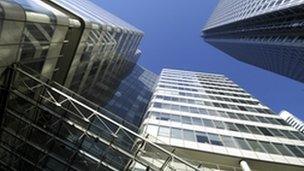The safety of banks wasn't on FSA agenda
- Published
- comments

The FSA's Canary Wharf HQ: bank safety was not on the agenda there
There are a number of terrifying statistics in the Financial Services Authority's report into the failure of Royal Bank of Scotland.
One is that at the end of 2007, it had capital - as measured on the new Basel lll international measure - equivalent to less than 2% of its risk-adjusted assets.
This means if those assets fell just 2% in value, the bank was bust.
And, just to be be clear, this means that it probably held genuinely loss-absorbing equity capital equivalent to around 1 per cent its gross assets (as opposed to the massaged-down, Basel risk-adjusted figure).
Now a 1% fall in the value of assets is not an unusual event, as anyone who has ever made any kind of investment knows.
Guess what? It happened to RBS in the autumn of 2008, which is why we as taxpayers had to rescue the bloated bank to the tune of £45.5bn.
However, the fragility of the bank was not conspicuous at the time because the Basel rules in force at the time (Basel l morphing into Basel ll) made it look as though RBS had around five times as much capital to absorb losses as was the case in reality.
Which was just one example of the woeful regulation of RBS and of other banks.
Another example is that between January 2006 and July 2007, only one of the 61 major topics discussed at the FSA's board meetings related to "bank prudential risks".
Also, of the items reported to the FSA board within the CEO's report, just "one out of 110 related to bank prudential issues either in general or in relation to specific banks" (says the FSA).
Or to put it another way, the safety and security of banks was hardly on the agenda of the FSA at all - just when the banks themselves were engaged in the most reckless lending and investing spree in British history.
Today the FSA, on its way to being broken up - with its bank supervision and regulation responsibilities being injected into the Bank of England - is a rather more engaged and interventionist regulator than it was.
Also, RBS - thanks to the generosity of taxpayers - today really does hold five times as much capital relative to its assets as it did.
So the stable door has - to an extent - been bolted.
And if the hurricane building in the eurozone smashes it open, the damage to RBS and to taxpayers should be less than in the whirlwind of 2008.
Which is some small comfort in these anxious times.